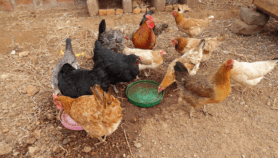Send to a friend
The details you provide on this page will not be used to send unsolicited email, and will not be sold to a 3rd party. See privacy policy.
Uganda has banned imports of live poultry and poultry products and set up a taskforce whose plan of action will be presented for government approval on 30 October.
“Bird experts tell us migratory birds could reach East Africa next week, so we’ve heightened preparedness, but there is no cause for alarm,” says Sam Okware, Uganda’s director-general of health services.
Okware says that with the World Health Organization’s support, Uganda has rapidly trained senior staff at laboratories in Congo and South Africa to diagnose and treat infected people. He adds that national health authorities are stockpiling drugs.
Gladys Kalema, a wildlife vet and director of local non-governmental organisation Conservation Through Public Health says the greatest worry is that domesticated birds contract the H5N1 bird flu virus from wild ones and then pass it on to humans. “Villages around national parks or bird sanctuaries, where domesticated fowls are reared could be hotspots,” she says.
But she adds that Ugandans should not worry too much about this. She believes the chances that migratory birds will reach Africa are small. “Incubation in wild birds takes a week. These birds take months to reach Africa from Asia, via Europe,” says Kalema. “Infected ones would die before reaching Africa.”













